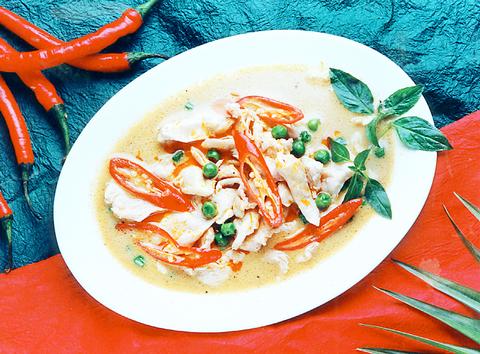When Yun Hsiang Yuan opened about five years ago it set up shop in a tiny closet-like space on one of the alleys around the Shihta market. The boss, Ms. Tao, was a third-year student at NTNU and the eatery was a money-making pastime that she didn't take too seriously. Nevertheless, word got out of the store's Burmese, Thai and Yunnan cuisines and lines started to form all the way down the alley and around the corner at every mealtime.
With this kind of popularity, Tao put her original plans for a career in teaching on the back burner and instead moved the restaurant to its significantly larger and nicer location a few parallel lanes away still in the Shihta night market area.
The recipes for this restaurant's dishes are all derived from Tao's aunt, who moved from Myanmar to join relatives in Taiwan. The family originated in Yunnan, where they were established gentry, but with the defeat of the KMT in the Chinese Civil War, the Taos fled to northern Myanmar and have trickled into Taiwan over the decades. A positive side to this refugee trauma was that the family picked up some wonderful culinary know-how along the way.

PHOTO: MAX WOODWORTH, TAIPEI TIMES
The three main styles of dishes mean that there is a staggering variety of food to choose from. The faint of heart may want to stick with the Thai standards like lemon fish, coconut chicken or beef and hot and sour fish soup, all of which are excellent and eye-poppingly spicy unless you ask for them not to be.
For something different, try some of the Yunnanese or Burmese dishes. The Shantou fish is a spicy Burmese specialty named after the country's Shantou tribe and is wonderfully refreshing in the summer heat. Likewise, the restaurant's new Thai seafood salad, with its lemon zing, is superb in this weather. The Yunnan papaya chicken, cooked with dried fruit strips, is another summer favorite.
The undisputed winner in the exotic category, however, is the Yunnan-style pig head skin and ear salad. "Not many people are willing to try this one, especially foreigners, but once they do, they keep ordering it every time they come back," Tao said.
One of the great aspects of Yun Hsiang Yuan is that its price variety allows diners of all budgets and appetites to walk away satisfied. Snack on samosas, the restaurant's one Indian dish, or stick with a plate of Thai fried rice for a simple meal at NT$65. Or, bring a group for the numerous set meals that allow up to 10 people to sample over a dozen of the eatery's specialties for about NT$2,500.
But come early or call in advance, because in the Shihta night market area, this cozy restaurant fills up fast and stays that way until the kitchen closes.

One of the biggest sore spots in Taiwan’s historical friendship with the US came in 1979 when US president Jimmy Carter broke off formal diplomatic relations with Taiwan’s Republic of China (ROC) government so that the US could establish relations with the People’s Republic of China (PRC). Taiwan’s derecognition came purely at China’s insistence, and the US took the deal. Retired American diplomat John Tkacik, who for almost decade surrounding that schism, from 1974 to 1982, worked in embassies in Taipei and Beijing and at the Taiwan Desk in Washington DC, recently argued in the Taipei Times that “President Carter’s derecognition

This year will go down in the history books. Taiwan faces enormous turmoil and uncertainty in the coming months. Which political parties are in a good position to handle big changes? All of the main parties are beset with challenges. Taking stock, this column examined the Taiwan People’s Party (TPP) (“Huang Kuo-chang’s choking the life out of the TPP,” May 28, page 12), the Democratic Progressive Party (DPP) (“Challenges amid choppy waters for the DPP,” June 14, page 12) and the Chinese Nationalist Party (KMT) (“KMT struggles to seize opportunities as ‘interesting times’ loom,” June 20, page 11). Times like these can

June 23 to June 29 After capturing the walled city of Hsinchu on June 22, 1895, the Japanese hoped to quickly push south and seize control of Taiwan’s entire west coast — but their advance was stalled for more than a month. Not only did local Hakka fighters continue to cause them headaches, resistance forces even attempted to retake the city three times. “We had planned to occupy Anping (Tainan) and Takao (Kaohsiung) as soon as possible, but ever since we took Hsinchu, nearby bandits proclaiming to be ‘righteous people’ (義民) have been destroying train tracks and electrical cables, and gathering in villages

Dr. Y. Tony Yang, Associate Dean of Health Policy and Population Science at George Washington University, argued last week in a piece for the Taipei Times about former president Ma Ying-jeou (馬英九) leading a student delegation to the People’s Republic of China (PRC) that, “The real question is not whether Ma’s visit helps or hurts Taiwan — it is why Taiwan lacks a sophisticated, multi-track approach to one of the most complex geopolitical relationships in the world” (“Ma’s Visit, DPP’s Blind Spot,” June 18, page 8). Yang contends that the Democratic Progressive Party (DPP) has a blind spot: “By treating any